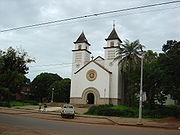
Religion in Guinea-Bissau
Encyclopedia

Guinea-Bissau
The Republic of Guinea-Bissau is a country in West Africa. It is bordered by Senegal to the north, and Guinea to the south and east, with the Atlantic Ocean to its west....
is Muslim
Muslim
A Muslim, also spelled Moslem, is an adherent of Islam, a monotheistic, Abrahamic religion based on the Quran, which Muslims consider the verbatim word of God as revealed to prophet Muhammad. "Muslim" is the Arabic term for "submitter" .Muslims believe that God is one and incomparable...
, and 5 to 13 percent is Christian
Christian
A Christian is a person who adheres to Christianity, an Abrahamic, monotheistic religion based on the life and teachings of Jesus of Nazareth as recorded in the Canonical gospels and the letters of the New Testament...
. The remainder of the population follows traditional indigenous or animist religious practices. There are few atheists. Islam is practiced most widely by the Fula
Fula people
Fula people or Fulani or Fulbe are an ethnic group spread over many countries, predominantly in West Africa, but found also in Central Africa and Sudanese North Africa...
and Mandinka
Mandinka people
The Mandinka, Malinke are one of the largest ethnic groups in West Africa with an estimated population of eleven million ....
ethnic groups, and Muslims generally live in the north and northeast. Virtually all Muslims are Sunni. Guinea-Bissau is the only Portuguese-speaking nation with a Muslim majority, wherein others are mostly Christian.
Practitioners of traditional indigenous religious beliefs generally live in all but the northern parts of the country. Christians belong to a number of groups, including the Roman Catholic Church
Roman Catholic Church
The Catholic Church, also known as the Roman Catholic Church, is the world's largest Christian church, with over a billion members. Led by the Pope, it defines its mission as spreading the gospel of Jesus Christ, administering the sacraments and exercising charity...
(including Portuguese Guinea-Bissauans) and various Protestant denominations. Christians are concentrated in Bissau
Bissau
Bissau is the capital city of Guinea-Bissau. The city's borders are conterminous with the Bissau Autonomous Sector. In 2007, the city had an estimated population of 407,424 according to the Instituto Nacional de Estatística e Censos...
and other large towns. Foreign missionaries operate in the country without restriction. The Constitution provides for freedom of religion
Freedom of religion
Freedom of religion is a principle that supports the freedom of an individual or community, in public or private, to manifest religion or belief in teaching, practice, worship, and observance; the concept is generally recognized also to include the freedom to change religion or not to follow any...
, and the Government generally respected this right in practice. In 2007, the US government received no reports of societal abuses or discrimination based on religious belief or practice.

